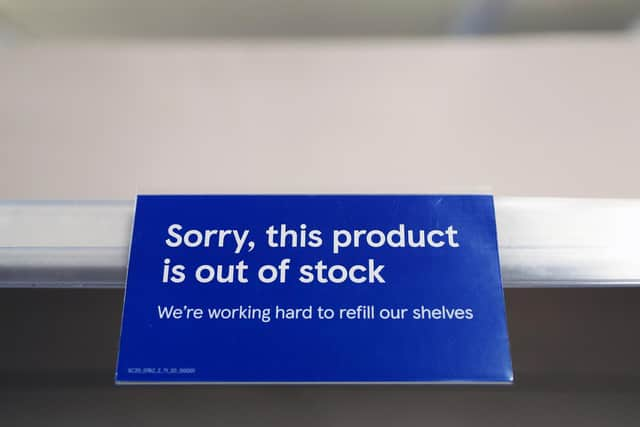Millions of pounds worth of panic-buying food is heading for the bin
and live on Freeview channel 276
But as people flock to the shops to fill their cupboards, is this doing more harm than good?
BusinessWaste.co.uk, a national waste collection company, warns that panic buying will result in more food being thrown away as people are buying far more than they need.
Advertisement
Hide AdAdvertisement
Hide AdCompany spokesman, Mark Hall, said: “At the moment there is a huge strain on supermarket supply chains to ensure there is enough food to go around during these difficult times.


“People should only buy what they need, otherwise they will only be throwing a lot of it away when it all goes out of date. There’s only so much you can eat.”
Greed in the aisles, bare shelves and full fridges
Fears of being housebound for the foreseeable future are causing people to fill up their cupboards, fridges and freezers in a bid to make sure they don’t run out of food.
Mark said: “Coronavirus is sending people into an overbuying frenzy. They’re wasting money on things they don’t even need or want, and it’ll only end up in the household bin.”
Advertisement
Hide AdAdvertisement
Hide AdHe said that you only need to see the empty shelves of your local supermarket to understand the extent of the problem.
A mother-of-three who said she was searching her third supermarket of the day for supplies sums up the national mood.
She said: “I’m only stockpiling because everyone else is. If I don’t get as much as I can when I see it, who knows when I’ll be able to get hold of it again?”
But as some clear the shelves and overfill their cupboards, Business Waste are concerned that others will be unable to get hold of basic supplies, which is why they are recommending that shoppers only buy what they know they will use in sensible quantities.
Advertisement
Hide AdAdvertisement
Hide AdMark said: “Some people cannot spend more than a set budget every week, therefore are unable to buy in bulk.
“It’s not fair to these people to excessively fill up your cupboards with fifteen bags of potatoes and a month supply of bread, when the likelihood is that most of this food will end up in landfill anyway. If everyone only buys what they need, then we can massively reduce the amount heading into the trash.”
Should we be limiting how much food we buy?
Many supermarkets have recently taken action to try and prevent stockpiling, by introducing war-like rations on how much people can buy.
Supermarkets such as Asda, Tesco and Sainsbury’s have restricted shoppers to a certain amount of each item, including everything from groceries to toiletries, in a bid to stop stockpiling and in due course a huge volume of waste.
Advertisement
Hide AdAdvertisement
Hide AdThese policies will be pivotal to making sure that people get the resources they need, without there being an increase in waste.
UK supermarkets are also introducing schemes to make sure that vulnerable customers can come in and safely get their shopping, such as only opening for the first hour to the elderly.
But it’s not just the elderly we need to be considerate of, it’s people with dietary requirements as well.
Mark said: “We need to be mindful of others when we shop. We need to leave enough for other people and not just buy it all and shove it into freezers. You could be denying a neighbour of something they desperately need.”
“It’s much better to make sure there’s enough food for everyone, than to buy too much and chuck it in the bin.”